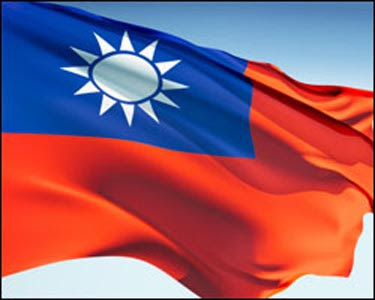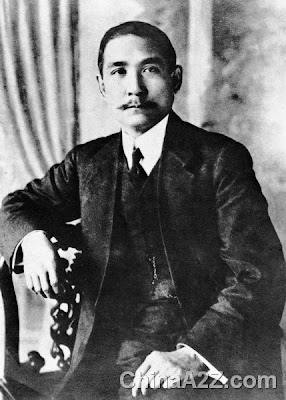 |
| Taiwanese Flag |
I live in Taoyuan City and travel through the downtown area frequently
on my scooter. There are a number of
streets there that I have been curious about.
Very near my home is San Min Lu, 三民路.
There are three other streets that have this same character Min (民) Minzu Lu 民族路, Minquan Lu 民權路 and Min Sheng
Lu民生路. Recently I came to understand the meaning of
these street names. The san min (the people’s principles) are the principles by
which Sun Yat Sen planned the government of the Republic of China. As we move toward Double Tenth day, or
Taiwan National Day, October 10, I want to discuss the “Father of Modern China,”
Sun Yat Sen and his legacy The San Min Doctrine.
Chinese-Taiwanese
history really began during the Qing Dynasty, actually toward the end of the
dynasty. After about 1850 the Qing
Dynasty had begun to lose power and influence, because the military power of
the dynasty had begun to wane. In
1900, the emperor tried to revive his power through the modernization of the
army. It was called the “New Army” and
the weapons of war were upgraded to the present time. But it was a case of too little too late. The New Army was full
of radical leaders, officers who saw the writing on the wall and had begun to
work for a new China and an end to the empire.
 |
| Sun Yat Sen |
Sun Yat Sen had
begun to rise in prominence in the minds of these men. His bold new ideas, his new philosophies had
begun to take hold of the imaginations of these generals and they began to
secretly follow his lead. His
philosophies gave power to the people and took power from the emperor.
As you might guess
the emperor saw this as treason and Sun Yat Sen spent years in exile,
physically, but his words and philosophies gained traction, especially among
the military leaders. The thing that
sparked their imagination was the San-Min三民 doctrine. In English, it has been translated as the three people’s
principles. Interestingly, these three
principles had taken root in Sun’s thinking through a speech by Abraham Lincoln
where he spoke the phrase, “Government of the people, by the people and for the
people.”
Mínzú Zhǔyì民族主義 is
sometimes called nationalism, but it would be far more accurate to call it, “Government
of the people.” Sun wanted to move away
from imperial or ethnic nationalism to the broader idea of civic nationalism,
uniting the five ethnicities into one people.
Mínquán Zhǔyì 民權主義,
or democracy is, “Government by the people.”
He viewed this as a western-style constitutional government. He longed for the power of the people to
express their political wishes over the tyranny of imperial rule.
Mínshēng Zhǔyì 民生主義, was called by Sun as the people’s
livelihood or “Government for the
people.” By livelihood Sun was thinking
of the people’s right to food, clothing, housing and transportation. He planned how an ideal government would
care for it’s people. There has been
much debate over the years as to Sun’s thoughts. He died before fully explaining this principle. The People’s Republic of China as a
socialist government believes that they best fulfill this principle; of course
the Republic of China, believes they have the handle on this ideology. It’s the classic argument of socialism vs.
capitalism and it plays out in geopolitical saber rattling and cold war.
These principles
grabbed the imaginations of the men tasked with the protection of the empire
form the outside forces. Many of the
generals and others were a part of the “Literary Society,” a radical
organization supporting Sun’s philosophies.
The Literary Society met secretly and kept secret membership lists until
Russian revolutionaries accidentally detonated a bomb the city of Wuhan in
Hubei province in central China. The
district of Wuchang was rocked by the explosion and as authorities gathered and
began to investigate the Literary Society membership lists were uncovered. Those generals and leaders understood well
what discovery meant. They knew the
empire would systematically track them down, arrest and execute
them. They had no choice so they rose
up and took over the government of the city.
Telegraph notices began to go out and within six weeks sixteen provinces
declared independence from the dynasty.
| The Sun Yat Sen Memorial, seen from the observation deck of the Taipei 101 |
The Wuchang
uprising gave way to the Xinhai Revolution.
Sun Yat Sen returned to China after looking for support in the west and
another man, Chiang Kai Shek returned from Japan, where he was a part of the
Imperial Army of Japan, to assume leadership of the Artillery Forces of the
R.O.C. By February twelfth, the
revolution was over, the Emperor had abdicated and the Republic of China became
the legal government of China.
At this time Sun
Yat Sen is thought of, both in the People’s Republic and the Republic of China,
as the Father of Modern China, he is revered in both places. But that’s where the consensus ends. Both governments see themselves as the
embodiment of the San Min Doctrine.
Both jealously cling to the idea that they are the ones who best
represent the people and desire of the Chinese and Taiwanese populations. In 1992 they gave voice to this idea, in an
agreement known as the, “1992 Consensus,” the main idea of which is that there
is one China, of which Taiwan is a part, but two different interpretations of
the who best exemplifies the principles of the San Min Doctrine, which of
course leads to the question of which system is the legal government of
China.
This isn't a political blog, there are others much more capable than I, in that realm. I'm not intending to debate the merits of the 1992 Consensus or even whether or not there is a consensus. There are those who don't agree there was a consensus. I am a believer in freedom and the rights of people to govern themselves free from tyranny and oppression and I leave the way to achieve that to the Taiwanese people.
Other posts you may be interested in:

Your extrapolation from Dr.Sun Yat Sen's three principles of the people to the 1992 Consensus which is the most heated topic among the 2012 ROC's presidential election is amazing.I like it.
ReplyDelete